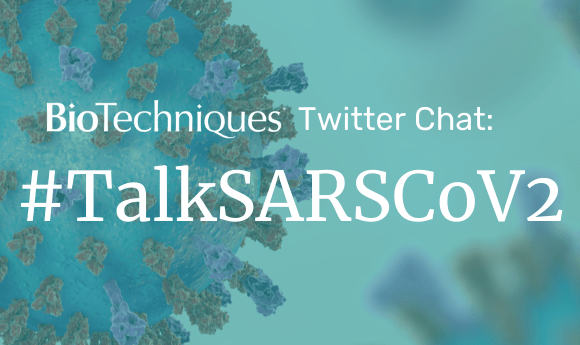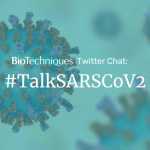COVID-19: the impact on research

A multidisciplinary panel of scientists addressed the impact of the COVID-19 pandemic on research. Catch up on the highlights of this discussion now.
On Friday 12 June, BioTechniques hosted a Twitter chat with a panel of researchers at different career stages – Carika Weldon (@CarikaElshae), Fay Lin (@xiaofei_lin), Jack Gilbert (@gilbertjacka) and Laura Boykin (@laura_boykin) – to assess the impact of the COVID-19 pandemic on science research.
Twitter chat for the impact of COVID-19 on research #TalkSARSCoV2
Find out more about our the panel involved in our Twitter chat #TalkSARSCoV2 to assess the impact of the COVID-19 pandemic on scientific research.
Check out some of our highlights from the Twitter chat:
- What impact has the COVID-19 pandemic had on you and your team?
- What adjustments have you had to make due to the COVID-19 pandemic?
- What has your line of research been able to tell us about SARS-CoV-2?
- Do you think the focus on COVID-19 could take away from the study of other crucial areas?
- What impact has the COVID-19 pandemic had on the integrity of the scientific method?
- What lessons can be learnt from COVID-19?
- If we could go back and re-do how we’ve dealt with the pandemic, what would you like to see change?
- What does the future look like for your research now, considering this pandemic?
- If you could provide one take-home message from this Twitter chat, what would it be?
What impact has the COVID-19 pandemic had on you and your team?
Jack has been working on COVID-19 research from early on in the pandemic:
As most of our team were involved in this work – sampling, processing swabs, extracting RNA, RT-qPCR, metagenomics, etc. it took our whole village and other labs like @KnightLabNews to make it work.
— Jack A Gilbert (@gilbertjacka) June 12, 2020
Fay highlighted the impact of the pandemic on mental health:
1. Mental health struggle.
I struggle with depression. Getting out of the house, and socializing with others was how I fought my urge to stay in bed. With those options now restricted, managing depression becomes that much harder.
— Fay Lin (@xiaofei_lin) June 12, 2020
What adjustments have you had to make due to the COVID-19 pandemic?
Carika completely changed her career trajectory, moving from nanopore sequencing to leading Bermuda’s testing response to COVID-19 and becoming the government’s science advisor:
I now no longer work on @nanopore sequencing. I am in charge of a completely new lab in my home country having been flown back by the government. This is also the first time my work has directly impacted patient care. I’m a basic science researcher so it’s been a shift.
— Dr Carika Weldon, MRSB, FIBMS (@CarikaElshae) June 12, 2020
She also highlighted the potential knock-on impact of the UK’s response to the pandemic:
Especially because a lot of other counties look to them for advice, including #Bermuda. As a overseas territory we look to the UK for guidance but at times we’ve been ahead of them in terms of testing and innovation.
— Dr Carika Weldon, MRSB, FIBMS (@CarikaElshae) June 12, 2020
Fay recognized the challenges of adjusting to working in a home environment, and shared some pointers:
Here are some WFH tips that helped me:
1. Wear jeans
2. Establish a work spot separate from your bedroom (if possible)
3. Schedule a virtual work hour with friends (everyone’s on the same call for company but engaging in their separate work)— Fay Lin (@xiaofei_lin) June 12, 2020
What has your line of research been able to tell us about SARS-CoV-2?
Jack was able to use his background in the study of how bacteria in our bodies and the surrounding environment can influence health and disease:
Importantly, the virus can also seemingly bind (still working to prove this) to the outside of certain bacteria increasing transmission efficiency, and making it easier for these bacteria to infect a human epithelial membrane.
— Jack A Gilbert (@gilbertjacka) June 12, 2020
Do you think the focus on COVID-19 could take away from the study of other crucial areas?
The panel believed that while some focuses have shifted, this should be short-term and not impact funding allocations. Many scientists have been able to maintain focus on their areas of research.
I think it has done this in all areas of medicine, from research to patient care. So much resources has gone into ensuring testing is done that other areas have sadly taken a back seat. I think now with the pandemic easing up this should get better #TalkSARSCoV2
— Dr Carika Weldon, MRSB, FIBMS (@CarikaElshae) June 12, 2020
Still alive and cared for (: pic.twitter.com/O0nalMOR1R
— Emily Kunselman (@oysteroasis) June 12, 2020
What impact has the COVID-19 pandemic had on the integrity of the scientific method?
Carika highlighted the potential flaws of the scientific method when it comes to making urgent and important decisions:
This has been INTERESTING to watch. I think patient care is so used to relying on others for validation (via peer reviewed journals and the like) so when decisions have to be urgently made without this, it’s caused some great hesitation. #TalkSARSCoV2
— Dr Carika Weldon, MRSB, FIBMS (@CarikaElshae) June 12, 2020
Jack, who is also Editor in Chief of the peer-reviewed journal mSystems, stated there is a careful balancing act between ensuring research is thorough and legitimate and publishing with urgency:
But we have always been careful with our work – it takes longer, but we can be proud that the majority of it is accurate – this time is no different. @sallardvt‘s hospital epidemiology work will be published when we are satisfied with the fidelity of the results #TALKsarscov2
— Jack A Gilbert (@gilbertjacka) June 12, 2020
What lessons can be learnt from COVID-19?
The panel’s key belief is that much can be learnt in academia on how to improve the mental and physical wellbeing of colleagues and students. They also touched on the importance of preparation and the key role of lab-based research.
For #science I think #Covid19 has shown just how important lab work is. It’s always been important but there has now been a HUGE apppreciation for it, especially in #Bermuda where science is more of a cool thing to do than practical. Our country will not be the same after this.
— Dr Carika Weldon, MRSB, FIBMS (@CarikaElshae) June 12, 2020
The power of the virtual space. Recently, I have met countless new people from around the world through virtual events. As research conferences, seminars, and more go virtual, scientists are increasingly expanding their networks beyond geographic barriers #TalkSARSCov2
— Fay Lin (@xiaofei_lin) June 12, 2020
We were very careful in our lab to ensure the mental health of all our colleagues, with a detailed plan to support everyone in the lab, that has proved essential in this time. I would like to see EVERY lab and university take mental wellbeing more seriously #TalkSARSCoV2
— Jack A Gilbert (@gilbertjacka) June 12, 2020
If we could go back and re-do how we’ve dealt with the pandemic, what would you like to see change?
Correcting misinformation, improved diversity and representation, and more rapid testing were the key alterations the panel would make:
We need to better incorporate science communication skills into science education. #COVID19 has emphasized how extensively misinformation can spread. #TalkSARSCoV2
— Fay Lin (@xiaofei_lin) June 12, 2020
A more diverse & inclusive approach. The Genomics ? response was mainly a white persons thing.
— Dr. Laura Boykin (@laura_boykin) June 12, 2020
Rapid testing and tracking – see Iceland and New Zealand!
— Jack A Gilbert (@gilbertjacka) June 12, 2020
What does the future look like for your research now, considering this pandemic?
This pandemic has highlighted we must work more closely with the human health teams in the countries where are working with smallholder farmers. And we must continue to center our work around women and their needs. #TalkSARSCoV2 #sequencing4farmers pic.twitter.com/s3nWRcTf9m
— Dr. Laura Boykin (@laura_boykin) June 12, 2020
Jack highlighted how the pandemic restricting travel and forcing work from home is something that individuals should consider continuing:
I would like to work from home a lot more generally. Maybe doing 3 days in the lab and 4 days at home. I think this will be better for my mental and physical health #TalkSARSCoV2
— Jack A Gilbert (@gilbertjacka) June 12, 2020
If you could provide one take-home message from this Twitter chat, what would it be?
Laura touched on the disparities that exist in scientific research that have been magnified by the pandemic:
We need every country to be ready to generate real-time whole genomes . We outlined how to do this: https://t.co/kcqojFg2JJ #TalkSARSCoV2 #sequencing4farmers
— Dr. Laura Boykin (@laura_boykin) June 12, 2020
This whole thing has made me realize how the internet is not globally accessible. My friends on the African continent were marginalized before and this has made it worse. Data is so expensive. No one can afford this virtual world we have created.
— Dr. Laura Boykin (@laura_boykin) June 12, 2020
And the BioTechniques Editors’ favorite take-home message is:
Facts!
— Dr. Laura Boykin (@laura_boykin) June 12, 2020
